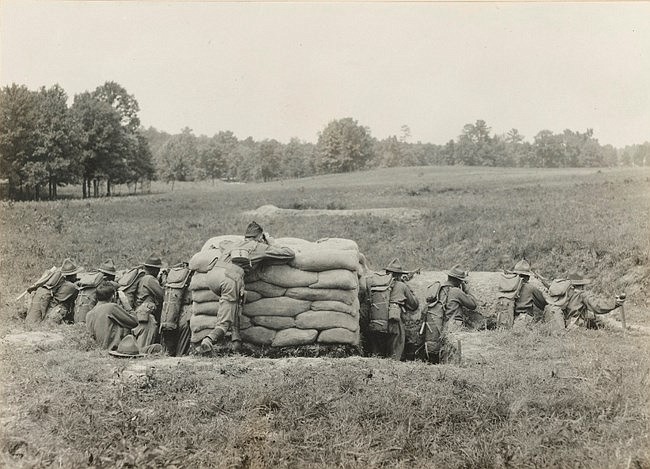On the 11th hour of the 11th day of the 11th month of 1918, the guns fell silent. Across Europe, from the muddy trenches of Ypres to Amiens, the sight of the Allied victory that convinced the German high command that victory in the Great War was unattainable, led to a silence that was overwhelming. After more than four years of fighting and the deaths of more than 9.7 million military personnel since the opening volleys on July 28, 1914, the armistice was greeted in the Tennessee Valley with prayers of thanksgiving and quiet celebrations. It was quite the contrast to the church bells and factory whistles that had, in April 1917, sounded the news that the United States had entered the fight to "make the world safe for democracy."
While the reasons for the Great War were far more complex than the assassination of the Austrian Archduke Franz Ferdinand, the news of President Woodrow Wilson's address to Congress on April 2, 1917, was met with overwhelming approval across the region. Some residents had already journeyed to Europe to fight against tyranny. Wilson began with the words, "I have called the Congress into extraordinary session because there are serious, very serious, choices of policy to be made ..." After detailing the atrocities committed by the German high command, Wilson brought the war home by noting, "It is a war against all nations. American ships have been sunk, American lives taken ... The challenge is to all mankind. Our motive will not be revenge or the victorious assertion of the physical might of the nation, but only the vindication of right, of human right ..."
While the Tennessee Valley had few residents who were recent immigrants from Germany, other areas of the nation did and President Wilson went on to clearly identify that, "We have no quarrel with the German people ... [these] peoples were nowhere consulted by their rulers and wars were provoked and waged in the interest of dynasties. ..." He concluded with words that stirred patriotic hearts, noting that American men would "fight for the things which we have always carried nearest our hearts - for democracy, for the right of those who submit to authority to have a voice in their own governments ... and make the world itself at last free."
An overwhelming majority of the people had voted for Wilson in the 1916 presidential election and, while he had maintained his goal of neutrality, area factories had already increased production as industrial leaders attempted to fill Allied war materiels needs. At the same time, many prepared for the U.S. entry into the war, believing that our involvement was necessary to end the stalemate and push toward an Allied victory. Wilson's address to Congress was greeted, as written accounts note, with "an unrestrained outpouring of patriotism." More than 10,000 Hamilton County men volunteered or were drafted under the Selective Service Act, passed by Congress on May 18, 1917, and more than 200 would give their lives.
Families across the county wholeheartedly embraced the cause. Victory gardens sprang up in back yards. Families turned their gas off on Sundays, choosing to eat foods prepared the previous day. Mondays were "heatless days," and everyone layered sweaters and coats in protection against one of the coldest winters on record. Days were declared "meatless," and the purchase of war bonds was equated with loyalty and patriotism.
Under the leadership of Genevieve Allan Montague, children collected pennies to support the war effort and women gathered to roll bandages, organize letter-writing campaigns and provide support for the troops training at nearby Fort Oglethorpe. Montague organized workers for area hospitals and travelers' aid stations while encouraging other volunteers to teach classes and provide lectures for the homesick troops. Churches and fraternal groups joined in the effort. The volunteers and programs were needed; Northwest Georgia witnessed additional construction projects as the United States prepared camps. The army created camps Nathan Bedford Forrest, Warden McLean and Greenleaf while also building war prisoner barracks and special quarters for civilian enemy aliens. Volunteers traveled to the camps each Sunday to provide entertainment and conversation as a remedy for the homesickness that plagued the trainees.
When the bells sounded the war's end on Nov. 11, 1918, Chattanooga residents gathered in their churches to remember the fallen and to pray for those returning home. They hoped the Great War was indeed "the war to end all wars."
Before it was Veterans Day, it was Armistice Day, and the guns fell silent.
Linda Moss Mines is the Chattanooga-Hamilton County historian, secretary of the Chattanooga Area Veterans Council and the regent, Chief John Ross Chapter, NSDAR.

